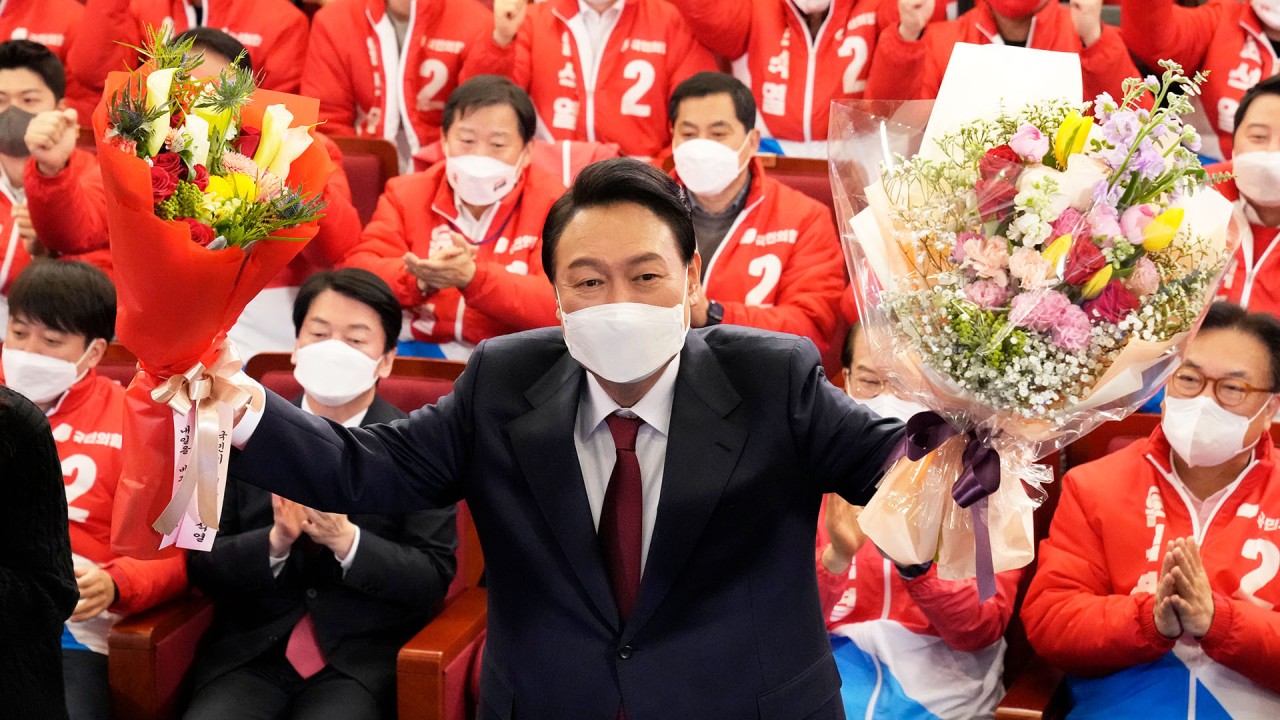
02:23
Who is South Korea’s newly elected president Yoon Suk-yeol and what are his plans?

Chinese President Xi Jinping and South Korea’s president-elect Yoon Suk-yeol pledged to further elevate bilateral ties between the two nations, after concerns that their diplomatic relationship may be tested over Yoon’s pro-Washington stance.
In a congratulatory message to Yoon on Friday, Xi said China and South Korea were close neighbours and important cooperative partners.
“Together with the South Korean side, the Chinese side is willing to firmly defend the original intentions of our establishment of diplomatic ties and deepen our friendly cooperation to promote the stable and long-term development of the China-South Korea strategic cooperative partnership and bring welfare to the two nations and our peoples,” Xi said, according to state news agency Xinhua.
Yoon, a former prosecutor who has signalled a tougher stance on Beijing and promised to join a US-led regional bloc targeting China, narrowly defeated his rival Lee Jae-myung of incumbent President Moon Jae-in’s ruling party.
Yoon spoke to US President Joe Biden over the phone hours after his election victory, during which Biden emphasised US commitment to South Korea’s defence.
“Together, they affirmed the strength of the US-ROK alliance, which is the linchpin for peace, security and prosperity in the Indo-Pacific,” the White House said, referring to the Republic of Korea, South Korea’s official name.
“The two also committed to maintain close coordination on addressing the threats posed by the Democratic People’s Republic of Korea’s [North Korea’s] nuclear and missile programmes.”
Before his victory, Yoon signalled he would pursue closer relations with the US, including buying another THAAD missile defence system as a countermeasure against North Korea.
Beijing has regarded the missile defence system as a security threat, and retaliated with economic measures when Seoul deployed the system in 2017. In November, Yoon said the deployment of THAAD was a “sovereign matter”.
In an article published last month in Foreign Affairs magazine, Yoon said “a deeper alliance with Washington should be the central axis of Seoul’s foreign policy”.
He promised to “willingly participate in” the Quad, a US-led grouping that includes Japan, India and Australia. Beijing regards the Quad as an attempt to create an “Indo-Pacific Nato” to contain China.
But in a meeting with Chinese envoy to Seoul Xing Haiming on Friday, Yoon expressed confidence about the future of their nations’ relationship.
“I’m certain South Korea-China relations will develop further,” he said at the People Power Party headquarters, noting that this year marked 30 years of diplomatic ties.
“The establishment of diplomatic relations was of great help to our two countries’ people in many ways. It also helped economic development.”
Benoit Hardy-Chartrand, an international affairs expert at Temple University in Tokyo, said Yoon’s previous remarks on a tougher approach on Beijing reflected a considerable shift in South Korean public opinion away from China since 2017.
“However, I question how far president-elect Yoon will be willing to go after taking office, once faced with the realities of regional geopolitics and geoeconomics,” he said.
“As much as he may intend to align more deeply with the US, he may waver given the potential costs that the Korean economy could bear, due to its dependence on the Chinese market. For instance, Yoon has expressed a desire to work with the Quad, but doing so would incur a stiff pushback from Beijing, who accuses the grouping of being anti-China,” he said.
Additional reporting by Shi Jiangtao